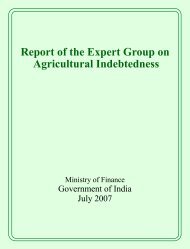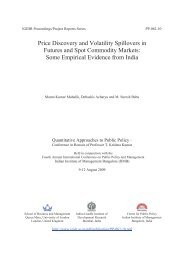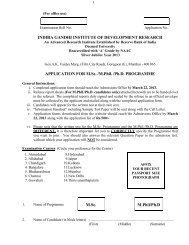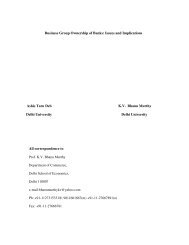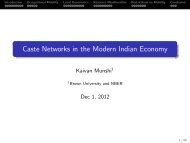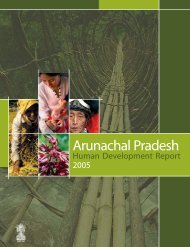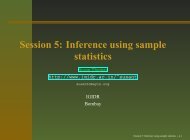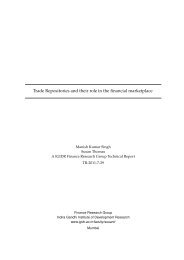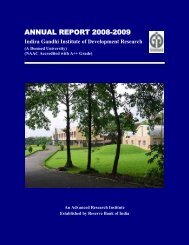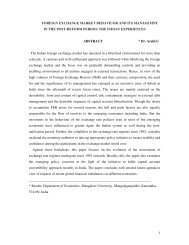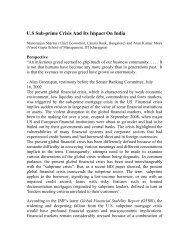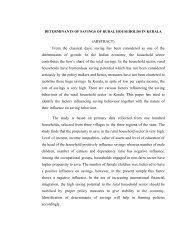Kerala 2005 - of Planning Commission
Kerala 2005 - of Planning Commission
Kerala 2005 - of Planning Commission
Create successful ePaper yourself
Turn your PDF publications into a flip-book with our unique Google optimized e-Paper software.
144<br />
2. Governance, Public Action<br />
and Development<br />
2.1 Redefining Public Action<br />
The remarkable performance <strong>of</strong> <strong>Kerala</strong> in enhancing the<br />
vector <strong>of</strong> human capabilities owes, as we know, very much<br />
to public action that has its historical antecedents. It is in<br />
the sense <strong>of</strong> popular demand and public provision that we<br />
define ‘public action’. In the human rights perspective, 3<br />
the demand side represents the claim <strong>of</strong> the potential<br />
right-holder (that is, the current beneficiary) along with the<br />
significance <strong>of</strong> the necessity and urgency that this claim be<br />
fulfilled. The supply side, on the other hand, represents the<br />
addressee’s, that is, the State’s, responsibilities vis-à-vis the<br />
beneficiary’s claim.<br />
It is significant to note that the complementary demandsupply<br />
dialectics implies an effective demand. Thus<br />
public action for development presupposes what we<br />
call an ‘effective political demand’, a counterpart <strong>of</strong><br />
Keynesian effective economic demand for market<br />
equilibrium (Keynes, 1930). 4 Just as purchasing power<br />
actuates effective economic demand, what effectuates<br />
public demand is organisation and mobilisation. Thus a<br />
dialectical equilibrium between popular demand (backed<br />
by a political purchasing power in terms <strong>of</strong> organisation<br />
and mobilisation) and public supply, if institutionalised<br />
and thus sustained, marks a virtuous development. In this<br />
sense, public action may be viewed as the engine <strong>of</strong> good<br />
governance.<br />
2.2 Good Governance and the Role <strong>of</strong> the State<br />
Such public action that brings in development in terms <strong>of</strong><br />
a demand-supply dialectics, as explained above, warrants<br />
the active role <strong>of</strong> the state as the ultimate collectivity. From<br />
a human rights perspective, the State is then identified<br />
as the correlative duty bearer in creating and sustaining<br />
an enabling environment for individuals to realise their<br />
freedom from deprivation, that is development. Thus,<br />
“the State, as a primary duty bearer, has the responsibility<br />
to do its utmost to eliminate poverty by adopting and<br />
implementing appropriate policies. And the accountability<br />
<strong>of</strong> the State needs to be defined in terms <strong>of</strong> implementation<br />
<strong>of</strong> policies.” (UNDP, 2000: 77). Though it is primarily an<br />
instrument in pursuance <strong>of</strong> the self-interested legitimation<br />
<strong>of</strong> the State, it could have far-reaching development<br />
implications. In <strong>Kerala</strong> too, as discussed elsewhere in this<br />
Report, despite being autarchic, the two princely states<br />
<strong>of</strong> Travancore and Cochin pioneered a development path<br />
through education and health in the name <strong>of</strong> welfare <strong>of</strong><br />
the subjects. And with the emergence <strong>of</strong> popular welfare<br />
politics, this development path became inalienable<br />
to <strong>Kerala</strong> and continued to be the mainstay <strong>of</strong> policy,<br />
irrespective <strong>of</strong> its political colour.<br />
2.3 Participatory Development<br />
It is true that the role <strong>of</strong> the State in good governance is<br />
immensely significant. However, the vast heterogeneity<br />
in local aspirations and perspectives, needs and<br />
responses, tends to leave the direct management <strong>of</strong> the<br />
State responsibility very difficult, if not impossible. It<br />
is here that the direct participation <strong>of</strong> the communities<br />
in ensuring and enhancing an enabling environment<br />
assumes significance. For a number <strong>of</strong> situations it is<br />
reasonable to assume that local communities have<br />
perfect information on the specific problems they face,<br />
the actual and the possible constraints they encounter,<br />
and the potential solutions to be explored. As such, their<br />
direct participation in the design and implementation<br />
<strong>of</strong> the policies and programmes makes the enterprise<br />
fruitful.<br />
The panchayats, an Indian tradition and the town assemblies,<br />
an American tradition, were among the early contributors<br />
to citizen participation, whereby all <strong>of</strong> the citizens in the<br />
community got together to decide on issues. In the Indian<br />
context it should, however, be noted that participation in<br />
the panchayat was based on caste divisions and as such it<br />
represented internal democracy within each social group,<br />
but not across the groups.<br />
‘Participation’ along with ‘empowerment’ had been a<br />
dominant concept 5 in sociology, anthropology and history<br />
for a long time before it experienced ‘a renaissance in<br />
the 1990s’ (Chambers, 1995: 30) through its adoption<br />
by political economy. There appeared to be ‘a paradigm<br />
shift to participatory development’ (ibid.), ‘from top-down<br />
3 See Kannan and Pillai (2004 and <strong>2005</strong>) for more details.<br />
4 This latter was developed from the Smithian ‘effectual demand’, the demand, which is ‘sufficient to effectuate the bringing <strong>of</strong><br />
the commodity to the market’, by ‘those who are willing to pay the natural price’ (Smith 1776 [1976]: 73). On this line we<br />
postulate, based on the objective development experience <strong>of</strong> <strong>Kerala</strong>, an effective political demand to ‘effectuate the bringing’<br />
<strong>of</strong> the progressive rights realisation that is development.<br />
5 Arnstein (1969) in her seminal work conceptualises public participation as a ladder with each rung corresponding to the extent<br />
<strong>of</strong> citizens’ power in determining public projects.



